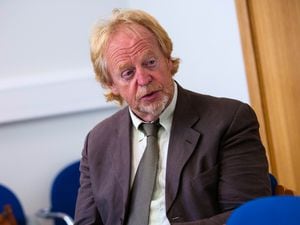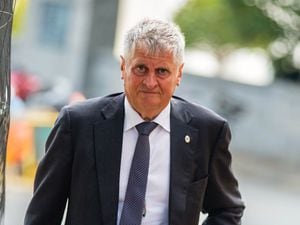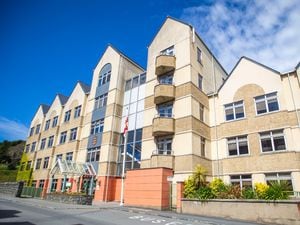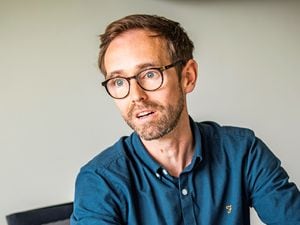‘I had no idea my dad was part of the liberating forces’
LEARNING about his father’s part in the liberation of Guernsey was an extremely emotional experience for a man from Shenstone, Staffordshire.
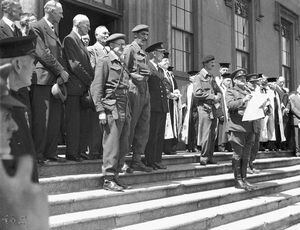
Steve Judd, 69, said his father had never wanted to discuss his army career with the family.
‘We knew he’d been to Guernsey, but we didn’t know what his involvement was at any level,’ he said.
Mr Judd was stunned therefore when he saw a photograph of his father standing on the steps of Elizabeth College near chief British emissary Brigadier Arthur E. Snow as he read the proclamation following the German surrender on 9 May 1945.
Despite holidaying in the island for many years with his family, Mr Judd knew nothing of his father’s part with Force 135.
‘I don’t know his length of service, where he served internationally, or in Guernsey, because he wouldn’t talk about the war and we had to respect that,’ he said.
Ronald Arthur Judd was a staff sergeant with the Royal Army Corps. He died on St George’s Day 1977 and was just 25 when Guernsey was liberated.
In dispatches in the London Gazette, he is mentioned for service in North Africa and North-West Europe, including D-Day.
‘I think my father witnessed events during the war that he didn’t want to talk about in later years,’ said Mr Judd jnr.
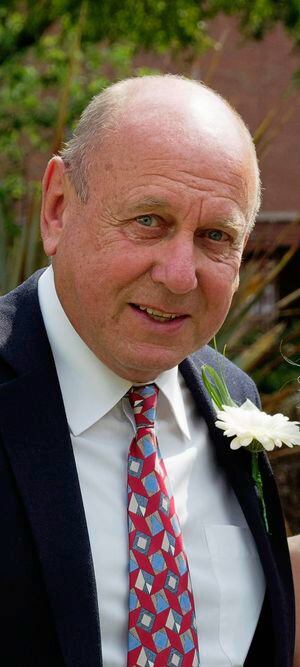
Mr Judd’s mother, Vera, died in 1992 so he said the trail of his father’s past had gone cold.
He knew he had been to Guernsey because, in 1953, when Vera’s sister, Audrey, then Harrison, was looking for a holiday destination, his father had recommended the island to her.
Audrey took up the recommendation and while in the island she met Emanuel [Manny] Tauliczek, who she was to marry.
He was exiled from Poland and had spent time in a Russian army camp. He represented his country in the 1932 Olympics in Los Angeles.
He worked for many years as a watchmaker for Paint the Jewellers, while Audrey was a nurse at the Princess Elizabeth Hospital. They would take their lunch together when they could and swim at the bathing pools.
Manny died in 1989 and his wife moved back to Birmingham after some 40 years and returned to her childhood home which, by coincidence, was on the market. She moved to a care home in 2015.
Mrs Tauliczek is now 95. Mr Judd would visit her fortnightly prior to the Covid pandemic.
When he and his sister, Christine Egan, went to visit her for her 90th birthday Mrs Egan produced a copy of the iconic photograph of their father taken on the steps of Elizabeth College.
‘This was a surprise to me and was an extremely emotional experience,’ said Mr Judd.
‘My sister also discovered another image from the internet from the Imperial War Museum [www.iwm.org.uk ref D24595] with my father in the top left-hand corner.’
In April, to mark the 43rd anniversary of his father’s death, Mr Judd contacted the Guernsey Press to see if he could obtain a better quality photograph, as the one he had was a poor photocopy.
He said he was delighted to get such a good quality photo with his father central to the image.
‘He’s only 25 in that picture,’ said Mr Judd. ‘He could have been involved in the war for five years at that point and it’s heartbreaking that he died aged only 57, when I was 26.’
In later life, Ronald Judd was a local government officer, a church organist, and a semi-professional pianist who played in pubs, wedding receptions, etc.
Steve Judd, now retired, who worked in insurance, believes his father co-wrote a book in London that was published which he thought was about the war, though he has no further information than that.
He and his family holidayed in Guernsey often up to the late 1970s or early 1980s and he said they were happy times.
‘We would enjoy simple walks with the dogs, including the Talbot Valley, where I seem to remember my uncle chatting to a very sociable hermit,’ he said.
‘Of course, we enjoyed the beaches and travelling on the old buses travelling at a rate that allowed such a slow and delightful pace of life.
‘Apart from the coastal fortifications, I have memories of visiting the German Underground Hospital, a sombre and sobering experience.’
He also recalled Maison Le Noury with its creaky wooden stairs and tiered plates being brought to tables with cakes on from which customers could take their pick.
n Mr Judd would like to hear from anyone who might be able to help him with information about his father.
Either email steviejudd1950@yahoo.com or call him on 07856 248302.

